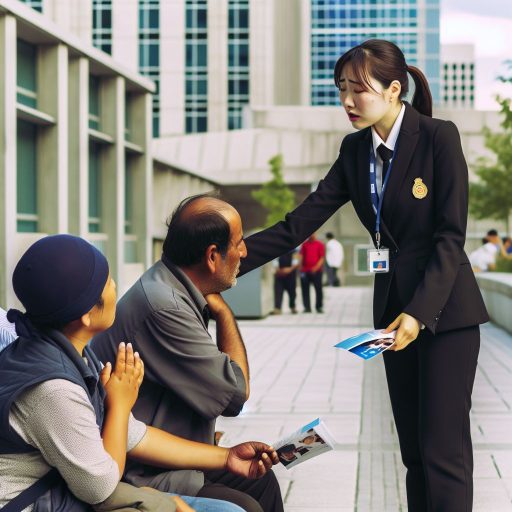Introduction:
Time management is crucial for volunteer coordinators to effectively organize and oversee volunteer activities.
The challenges they face include juggling various tasks, coordinating schedules, and ensuring smooth operations.
Tips for Effective Time Management:
- Set Priorities: Identify key tasks and prioritize them based on urgency and importance.
- Use a Calendar: Utilize a digital or physical calendar to schedule meetings, events, and deadlines.
- Delegate Responsibilities: Allocate tasks to volunteers based on their strengths and availability.
- Limit Distractions: Minimize interruptions and stay focused on critical tasks to maximize productivity.
- Establish Routine: Create a consistent schedule for routine tasks and allocate specific time slots for each.
- Communicate Effectively: Keep volunteers informed about schedules, tasks, and changes to avoid last-minute rushes.
- Take Breaks: Incorporate short breaks to recharge and maintain productivity throughout the day.
- Regularly Review: Reflect on your progress, identify areas of improvement, and adjust your time management strategies accordingly.
- Seek Support: Don’t hesitate to ask for help from fellow coordinators, volunteers, or supervisors when needed.
- Celebrate Achievements: Recognize and appreciate the hard work of volunteers to boost morale and create a positive work environment.
By implementing these time management tips, volunteer coordinators can enhance their efficiency, reduce stress, and ensure the successful execution of volunteer programs.
Set Clear Goals and Priorities:
Define specific goals for the organization and prioritize tasks accordingly.
Identify key objectives and focus on tasks that align with those goals.
Use tools like task lists and calendars to keep track of priorities.
Time Blocking:
Allocate specific time blocks for different tasks or projects.
Avoid multitasking and focus on one task at a time.
Schedule regular breaks to recharge and stay productive.
Delegate Responsibilities:
Assign tasks to volunteers based on their skills and strengths.
Empower volunteers to take ownership and responsibility for their tasks.
Provide clear instructions and guidelines for delegated tasks.
Effective Communication:
Keep volunteers informed about upcoming events, meetings, and deadlines.
Establish open lines of communication for feedback and suggestions.
Use various communication channels like email, phone, and meetings.
Prioritize Self-Care:
Take care of your physical and mental well-being to avoid burnout.
Schedule time for relaxation, hobbies, and activities outside of volunteering.
Set boundaries and learn to say no when needed.
Delegate Tasks Effectively:
- Assign responsibilities to volunteers based on their skills and interests
- Empower volunteers to take ownership of their tasks
- Regularly communicate with volunteers to ensure they have the resources they need to succeed
Delegating tasks effectively is crucial for volunteer coordinators to ensure that all responsibilities are being handled efficiently.
By assigning responsibilities to volunteers based on their skills and interests, you can maximize their potential and productivity.
Transform Your Career Today
Unlock a personalized career strategy that drives real results. Get tailored advice and a roadmap designed just for you.
Start NowVolunteers are more likely to excel in tasks that align with their strengths, so taking the time to match them with suitable roles is essential.
Empowering volunteers to take ownership of their tasks is another key aspect of effective task delegation.
When volunteers feel a sense of ownership over their responsibilities, they are more motivated to see them through to completion.
This can lead to increased engagement and satisfaction among volunteers, as they feel valued for their contributions.
Regular communication with volunteers is essential to ensure they have the resources they need to succeed in their roles.
By staying in touch with volunteers on a regular basis, you can identify any challenges they may be facing and provide the necessary support.
This can help prevent issues from escalating and ensure that volunteers feel supported throughout their time with your organization.
Delegating tasks effectively is essential for volunteer coordinators to ensure the success of their volunteer programs.
By assigning responsibilities based on skills and interests, empowering volunteers to take ownership, and maintaining regular communication, coordinators can maximize volunteer engagement and productivity.
Find Out More: Legal Advocacy for Domestic Violence Survivors Explained
Establish a Routine:
- Establish a daily or weekly routine for managing tasks and responsibilities.
- Schedule specific times for checking emails, returning phone calls, and reviewing progress.
- Stick to a consistent schedule to maintain productivity and avoid overwhelm.
Creating a routine is essential for volunteer coordinators to stay organized and effective in their roles.
By establishing a daily or weekly routine, coordinators can prioritize tasks and responsibilities, ensuring that nothing falls through the cracks.
One of the first steps in creating a routine is to identify the most critical tasks that need to be completed regularly.
This could include communicating with volunteers, planning upcoming events, or updating any necessary documentation.
Once these tasks are identified, coordinators can then allocate specific times during the day or week to focus on each one.
For example, coordinators may set aside the first hour of each morning to check and respond to emails from volunteers.
They could then schedule another block of time in the afternoon to return phone calls and follow up on any outstanding issues.
By breaking up their tasks into smaller, manageable chunks, coordinators can ensure that everything gets done without feeling overwhelmed.
Consistency is key when it comes to establishing a routine.
Showcase Your Business Today
Reach thousands of readers actively exploring professional services. Publish your business profile and grow your audience now.
Publish NowBy sticking to a set schedule, coordinators can develop good habits that help them maintain productivity and stay on top of their workload.
Over time, following a routine will become second nature, making it easier to juggle multiple tasks and responsibilities efficiently.
Creating a routine is a simple yet effective time management tip for volunteer coordinators.
By establishing a schedule for managing tasks and responsibilities, coordinators can prioritize their workload, maintain productivity, and avoid becoming overwhelmed.
By following these steps, volunteer coordinators can streamline their workflow and make the most of their time.
Gain More Insights: Building Trust with Children and Families
Use Technology to Streamline Processes:
Technology has become an indispensable tool in the modern world.
Volunteer coordinators can benefit immensely from using it to streamline their processes.
By harnessing the power of technology, coordinators can simplify tasks, improve communication, and increase overall efficiency.
One of the most effective ways to leverage technology as a volunteer coordinator is by using volunteer management software.
This type of software can help you streamline tasks like scheduling volunteer shifts, communicating important information to volunteers, and tracking volunteer hours.
By centralizing all this information in one place, you can save time and ensure that nothing falls through the cracks.
Automating repetitive tasks is another great way to save time and reduce the risk of errors.
Technology can help you automate processes like sending out reminders to volunteers, generating reports, and updating volunteer databases.
By automating these tasks, you can free up more time to focus on other important aspects of your role as a coordinator.
In addition to simplifying day-to-day tasks, technology can also be used to improve event planning, social media management, and data analysis.
There are countless tools available that can help you plan and promote events more effectively.
You can also manage your organization’s social media presence and analyze data to track the impact of your volunteer program.
Overall, incorporating technology into your role as a volunteer coordinator can help you work more efficiently.
You will communicate more effectively and ultimately make a bigger impact in your community.
By embracing the power of technology, you can take your volunteer coordination skills to the next level.
Ensuring that your program runs smoothly and successfully is essential.
- Utilize volunteer management software to simplify tasks like scheduling, communication, and tracking volunteer hours.
- Automate repetitive tasks to save time and reduce the risk of errors.
- Leverage technology tools for event planning, social media management, and data analysis.
See Related Content: Rehabilitation Counseling: Self-Care for Professionals
Practice Effective Communication:
Communication is key in successfully managing volunteers and coordinating their efforts.
To ensure smooth operations and effective teamwork, volunteer coordinators must practice effective communication strategies.
Here are some tips to help you master this crucial skill:
- Maintain open lines of communication with volunteers, staff, and stakeholders.
- Hold regular meetings to discuss progress, challenges, and goals.
- Use clear and concise messaging to ensure everyone is on the same page.
By practicing effective communication, volunteer coordinators can foster a positive and productive work environment.
Everyone will be informed, engaged, and motivated to contribute towards the organization’s mission and goals.
Remember, communication is a two-way street.
Be open to feedback, listen attentively, and address any concerns promptly to maintain strong relationships with your team.
Delve into the Subject: Effective Communication for Crisis Intervention Specialists

Take breaks and practice self-care.
- Avoid burnout by taking regular breaks throughout the day.
- Prioritize self-care activities like exercise, healthy eating, and relaxation.
- Recognize signs of stress and seek support when needed.
Importance of Taking Breaks and Self-Care for Volunteer Coordinators
Volunteer coordinators play a crucial role in managing and organizing volunteers for various events and projects.
They are responsible for ensuring that everything runs smoothly and efficiently, which can be a challenging task.
To maintain their productivity and well-being, volunteer coordinators must prioritize taking breaks and practicing self-care.
Avoiding Burnout
One key reason why volunteer coordinators should take breaks is to avoid burnout.
The constant pressure of managing volunteers, meeting deadlines, and handling unforeseen challenges can take a toll on their mental and physical health.
By taking regular breaks throughout the day, volunteer coordinators can recharge and prevent burnout.
Importance of Self-Care Activities
Self-care activities are essential for volunteer coordinators to maintain their overall well-being.
Activities like exercise, healthy eating, and relaxation can help reduce stress levels, improve mood, and increase energy levels.
Showcase Your Business Today
Reach thousands of readers actively exploring professional services. Publish your business profile and grow your audience now.
Publish NowBy prioritizing self-care, volunteer coordinators can enhance their performance and effectiveness in their roles.
Recognizing Signs of Stress
It is important for volunteer coordinators to recognize the signs of stress and burnout in order to address them effectively.
Symptoms like fatigue, irritability, lack of motivation, and difficulty concentrating are common indicators of stress.
When these signs arise, volunteer coordinators should seek support from colleagues, friends, or mental health professionals.
Incorporating Breaks and Self-Care into Daily Routine
Here are some practical tips for volunteer coordinators to incorporate breaks and self-care activities into their daily routine:
- Schedule short breaks throughout the day to rest and recharge.
- Set boundaries and prioritize tasks to avoid feeling overwhelmed.
- Engage in physical activities like walking, stretching, or yoga during breaks.
- Practice mindfulness or meditation to reduce stress and improve focus.
- Eat nutritious meals and stay hydrated to maintain optimal energy levels.
- Allocate time for hobbies, interests, and relaxation outside of work hours.
- Seek support from colleagues, friends, or support groups when feeling overwhelmed.
By taking breaks and practicing self-care, volunteer coordinators can improve their productivity, well-being, and overall job satisfaction.
It is essential for volunteer coordinators to prioritize their health and happiness in order to effectively fulfill their roles and responsibilities.
Evaluate and Adjust Strategies:
Continuously monitor progress towards goals and make adjustments as needed.
Solicit feedback from volunteers and stakeholders to improve processes.
Reflect on successes and failures to learn and grow as a volunteer coordinator.
- Continuously monitor progress towards goals and make adjustments as needed.
- Solicit feedback from volunteers and stakeholders to improve processes.
- Reflect on successes and failures to learn and grow as a volunteer coordinator.
Acknowledge the Hard Work and Dedication of Volunteers
Volunteer coordinators should make it a priority to acknowledge the hard work and dedication of their volunteers.
This can be done through regular thank you messages, recognizing exceptional contributions, or hosting appreciation events.
Celebrate Milestones and Accomplishments to Boost Morale and Motivation
By celebrating milestones and accomplishments, volunteer coordinators can boost morale and motivation among their volunteers.
This can be as simple as acknowledging a volunteer’s first year of service or recognizing a team for reaching a fundraising goal.
Express Gratitude Through Personal Notes, Public Recognition, or Small Tokens of Appreciation
One of the most effective ways to show gratitude is through personal notes.
Taking the time to write a heartfelt thank you message can go a long way in making volunteers feel valued.
Public recognition, such as mentioning volunteers in a newsletter or at an event, can also show appreciation.
Small tokens of appreciation, like a gift card or certificate, can be a tangible way to express gratitude.
Key Time Management Tips for Volunteer Coordinators
Effective time management is crucial for volunteer coordinators to ensure smooth operations and maximize impact.
Strategies to Implement
Implementing these tips will help streamline processes, increase efficiency, and ultimately enhance the volunteer experience.
Maximizing Impact
By managing time effectively, volunteer coordinators can focus on what truly matters.
This focus leads to a more fulfilling and impactful volunteer program.
Additional Resources
11-9151.00 – Social and Community Service Managers
Social and Community Service Managers : Occupational Outlook …
[E-Books for Sale]
The Big Book of 500 High-Paying Jobs in America: Unlock Your Earning Potential
$19.99 • 500 High-Paying Jobs • 330 pages
Explore 500 high-paying jobs in America and learn how to boost your career, earn more, and achieve success!
See All 500 High-Paying Jobs of this E-Book
1001 Professions Without a Degree: High-Paying American Jobs You Can Start Now
$19.99 • 1001 Professions Without a Degree • 174 pages
Discover 1001 high-paying jobs without a degree! Unlock career tips, skills, and success strategies for just $19.99!




